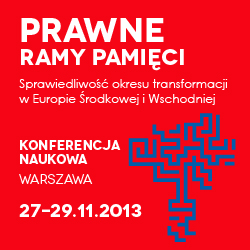Legal Frames of Memory. Transitional Justice in Central and Eastern Europe
October 30, 2013 -
Example Author
-
News Briefs

baner250.jpg
The international conference “Legal Frames of Memory. Transitional Justice in Central and Eastern Europe” (Warsaw, November 27th to 29th 2013) will focus on the relationship between memory and law as well as concepts of justice with reference to post-communist transformations. Speakers from various countries will discuss the ways in which law and collective and individual memory are intertwined. The conference is a part of the Genealogies of Memory project organised by European Network Remembrance and Solidarity. More: www.genealogies.enrs.eu
“Transitional justice” – roundtable debate, November 21st 2013
During the debate, we would like to bring the issues of national remembrance, modern history and transition to general awareness as well as to introduce to wider audience the subject of this year’s “Genealogies of Memory” conference, titled “Legal Frames of Memory. Transitional Justice in Eastern and Central Europe”. The open meeting will serve to analyse different legal instruments used by East European states in order to compensate the victims of communist regimes and different experiences of post-communist states with dealing with the past.
Legal Frames of Memory. Transitional Justice in Central and Eastern Europe, November 27th to 29th 2013
The Legal Frames of Memory: Transitional Justice in Central and Eastern Europe conference, will discuss the relationship between memory and law as well as concepts of justice with reference to post-communist transformations. The event will focus on phenomena unique to the experience of Central and Eastern Europe with regard to post-communist settlements:
retributive justice, i.e., trials, decommunisation and vetting;
restorative justice, i.e., rehabilitation of political prisoners, restitution of nationalized property, compensation;
institutes of national remembrance and the issue of access to the files of the communist security apparatus.
The conference will examine the relationship between law and memory. It will consider law as a framework of social memory from the perspective of legitimizing certain norms, values, and visions of the past. The conference will moreover cover the way legal discourse merges with other aspects of social life, including the concepts of justice defined in the works of historians, media, and cultural texts.
Conference participants include researchers of memory from different fields, including sociologists, anthropologists, and philosophers of law who study the issues of justice and settlement processes in post-communist Central and Eastern Europe. The comparative global aspect will be discussed during presentations by the invited experts on the issue of memory and transitional justice. The keynote speech will be given by prof. Elazar Barkan, Director of the Human Rights Concentration at Columbia’s School of International and Public Affairs. Invited speakers for the conference are: Christiane Wilke (Associate Professor in the Department of Law and Legal Studies at Carleton University), Mark Osiel (Professor of Law in University of Iowa College of Law), Nadya Nedelsky (Associate Professor in the International Studies Department at Macalester College in Saint Paul, Minnesota), Eva-Clarita Pettai (senior researcher at the Institute of Government and Politics, University of Tartu) and Lavinia Stan (Associate Professor at St. Francis Xavier University in Canada).
Conference Committee:
Convenors: Prof. Jiři Přibáň (Cardiff University), Dr. Małgorzata Pakier (Warsaw University of Social Science and Humanities), Dr. Stanisław Tyszka (University of Warsaw).
Advisory Board: Prof. Adam Czarnota (Onati International Institute for the Sociology of Law), Marián Gula (Nation’s Memory Institute UPN), Prof. Andrzej Kojder (Warsaw University), Prof. Jerzy Kwaśniewski (Warsaw University), Prof. Jeffrey Olick (University of Virginia), Prof. Andrzej Paczkowski (Collegium Civitas), Prof. István Rév (Central European University and Open Society Archives), Prof. Jan Rydel (European Network of Remembrance and Solidarity), Prof. Dariusz Stola (Collegium Civitas and Polish Academy of Sciences), Dr. Oldřich Tůma (Academy of Sciences of the Czech Republic), Dr. Joanna Wawrzyniak (Warsaw University and Freiburg Institute for Advanced Studies).
Organisers: European Network Remembrance and Solidarity (Warsaw); Collegium Civitas (Warsaw); Institute of Social Prevention and Resocialization, Warsaw University; Institute of Contemporary History of the Academy of Sciences of the Czech Republic (USD); Nation’s Memory Institute (UPN, Slovakia); Open Society Archives (Hungary).
“Genealogies of Memory” Project
This project was started by the European Network Remembrance and Solidarity in 2011. The Project’s aims are:
to facilitate academic exchange among Central and Eastern European researchers working on memory issues,
to promote Central and Eastern European memory studies in the international academic community,
to discuss the theories and methods of studies of individual and collective memory,
to determine the specificity of Central and Eastern Europe in the relationship between history and memory by examining the changing memory practices in this region during the 20th and 21st centuries.
In order to highlight the importance of this topic, the Genealogies of Memory team organizes seminars, an annual conference, and supports the publication of articles in peer-reviewed journals and edited volumes. The video recordings (in Polish and English) and abstracts of all presentations given during “Genealogies of Memory” meetings are available on the project’s website: www.genealogies.enrs.eu

































